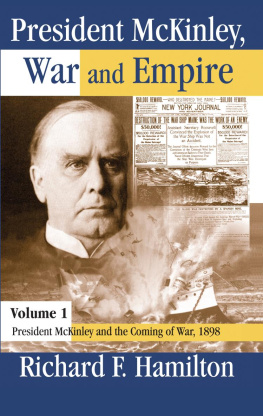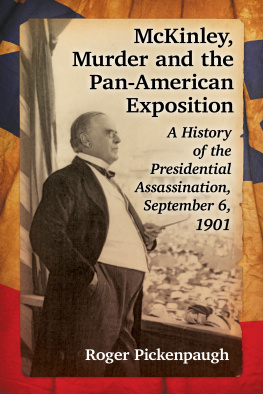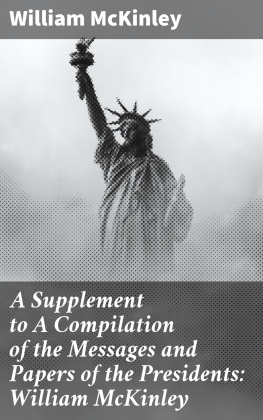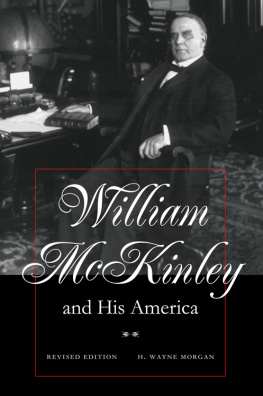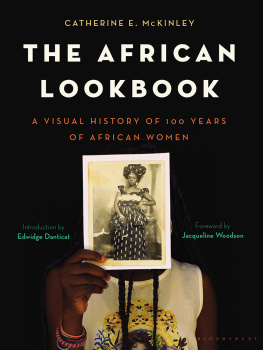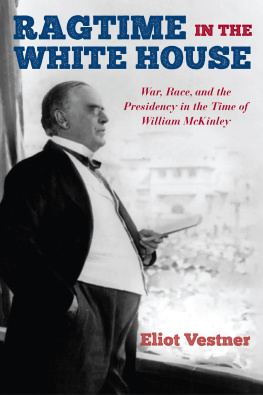McKinley William - William McKinley
Here you can read online McKinley William - William McKinley full text of the book (entire story) in english for free. Download pdf and epub, get meaning, cover and reviews about this ebook. City: United States;USA, year: 2003, publisher: Henry Holt and Co.;Times Books, genre: Science. Description of the work, (preface) as well as reviews are available. Best literature library LitArk.com created for fans of good reading and offers a wide selection of genres:
Romance novel
Science fiction
Adventure
Detective
Science
History
Home and family
Prose
Art
Politics
Computer
Non-fiction
Religion
Business
Children
Humor
Choose a favorite category and find really read worthwhile books. Enjoy immersion in the world of imagination, feel the emotions of the characters or learn something new for yourself, make an fascinating discovery.

- Book:William McKinley
- Author:
- Publisher:Henry Holt and Co.;Times Books
- Genre:
- Year:2003
- City:United States;USA
- Rating:3 / 5
- Favourites:Add to favourites
- Your mark:
- 60
- 1
- 2
- 3
- 4
- 5
William McKinley: summary, description and annotation
We offer to read an annotation, description, summary or preface (depends on what the author of the book "William McKinley" wrote himself). If you haven't found the necessary information about the book — write in the comments, we will try to find it.
William McKinley — read online for free the complete book (whole text) full work
Below is the text of the book, divided by pages. System saving the place of the last page read, allows you to conveniently read the book "William McKinley" online for free, without having to search again every time where you left off. Put a bookmark, and you can go to the page where you finished reading at any time.
Font size:
Interval:
Bookmark:
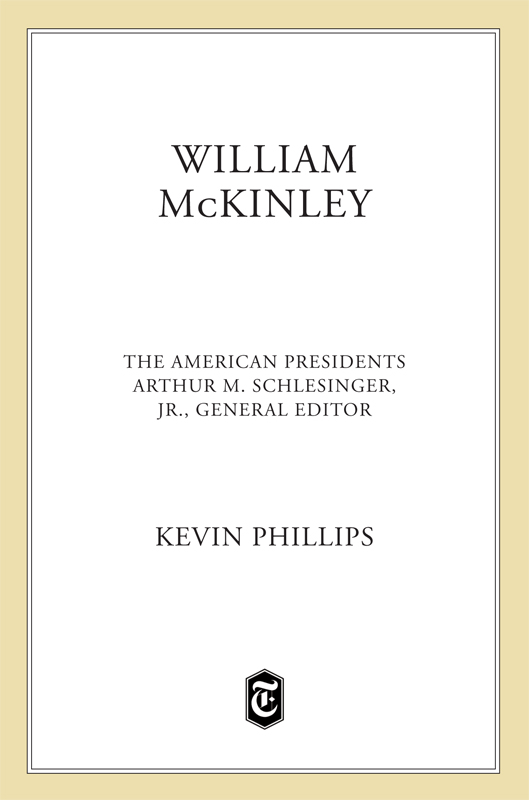


The author and publisher have provided this e-book to you for your personal use only. You may not make this e-book publicly available in any way. Copyright infringement is against the law. If you believe the copy of this e-book you are reading infringes on the authors copyright, please notify the publisher at: us.macmillanusa.com/piracy.
Contents
TO
WALTER DEAN BURNHAM
AND
SAMUEL LUBELL
who introduced me to the meaning of the election of 1896
Editors Note
THE AMERICAN PRESIDENCY
The president is the central player in the American political order. That would seem to contradict the intentions of the Founding Fathers. Remembering the horrid example of the British monarchy, they invented a separation of powers in order, as Justice Brandeis later put it, to preclude the exercise of arbitrary power. Accordingly, they divided the government into three allegedly equal and coordinate branchesthe executive, the legislative, and the judiciary.
But a system based on the tripartite separation of powers has an inherent tendency toward inertia and stalemate. One of the three branches must take the initiative if the system is to move. The executive branch alone is structurally capable of taking that initiative. The Founders must have sensed this when they accepted Alexander Hamiltons proposition in the Seventieth Federalist that energy in the executive is a leading character in the definition of good government. They thus envisaged a strong presidentbut within an equally strong system of constitutional accountability. (The term imperial presidency arose in the 1970s to describe the situation when the balance between power and accountability is upset in favor of the executive.)
The American system of self-government thus comes to focus in the presidencythe vital place of action in the system, as Woodrow Wilson put it. Henry Adams, himself the great-grandson and grandson of presidents as well as the most brilliant of American historians, said that the American president resembles the commander of a ship at sea. He must have a helm to grasp, a course to steer, a port to seek. The men in the White House (thus far only men, alas) in steering their chosen courses have shaped our destiny as a nation.
Biography offers an easy education in American history, rendering the past more human, more vivid, more intimate, more accessible, more connected to ourselves. Biography reminds us that presidents are not supermen. They are human beings too, worrying about decisions, attending to wives and children, juggling balls in the air, and putting on their pants one leg at a time. Indeed, as Emerson contended, There is properly no history; only biography.
Presidents serve us as inspirations, and they also serve us as warnings. They provide bad examples as well as good. The nation, the Supreme Court has said, has no right to expect that it will always have wise and humane rulers, sincerely attached to the principles of the Constitution. Wicked men, ambitious of power, with hatred of liberty and contempt of law, may fill the place once occupied by Washington and Lincoln.
The men in the White House express the ideal and the values, the frailties and the flaws, of the voters who send them there. It is altogether natural that we should want to know more about the virtues and the vices of the fellows we have elected to govern us. As we know more about them, we will know more about ourselves. The French political philosopher Joseph de Maistre said, Every nation has the government it deserves.
At the start of the twenty-first century, forty-two men have made it to the Oval Office. (George W. Bush is counted our forty-third president, because Grover Cleveland, who served nonconsecutive terms, is counted twice.) Of the parade of presidents, a dozen or so lead the polls periodically conducted by historians and political scientists. What makes a great president?
Great presidents possess, or are possessed by, a vision of an ideal America. Their passion, as they grasp the helm, is to set the ship of state on the right course toward the port they seek. Great presidents also have a deep psychic connection with the needs, anxieties, dreams of people. I do not believe, said Wilson, that any man can lead who does not act under the impulse of a profound sympathy with those whom he leadsa sympathy which is insightan insight which is of the heart rather than of the intellect.
All of our great presidents, said Franklin D. Roosevelt, were leaders of thought at a time when certain ideas in the life of the nation had to be clarified. So Washington incarnated the idea of federal union, Jefferson and Jackson the idea of democracy, Lincoln union and freedom, Cleveland rugged honesty. Theodore Roosevelt and Wilson, said FDR, were both moral leaders, each in his own way and his own time, who used the presidency as a pulpit.
To succeed, presidents must not only have a port to seek but they must convince Congress and the electorate that it is a port worth seeking. Politics in a democracy is ultimately an educational process, an adventure in persuasion and consent. Every president stands in Theodore Roosevelts bully pulpit.
The greatest presidents in the scholars rankings, Washington, Lincoln, and Franklin Roosevelt, were leaders who confronted and overcame the republics greatest crises. Crisis widens presidential opportunities for bold and imaginative action. But it does not guarantee presidential greatness. The crisis of secession did not spur Buchanan or the crisis of depression spur Hoover to creative leadership. Their inadequacies in the face of crisis allowed Lincoln and the second Roosevelt to show the difference individuals make to history. Still, even in the absence of first-order crisis, forceful and persuasive presidentsJefferson, Jackson, Theodore Roosevelt, Ronald Reaganare able to impose their own priorities on the country.
The diverse drama of the presidency offers a fascinating set of tales. Biographies of American presidents constitute a chronicle of wisdom and folly, nobility and pettiness, courage and cunning, forthrightness and deceit, quarrel and consensus. The turmoil perennially swirling around the White House illuminates the heart of the American democracy.
It is the aim of the American Presidents series to present the grand panorama of our chief executives in volumes compact enough for the busy reader, lucid enough for the student, authoritative enough for the scholar. Each volume offers a distillation of character and career. I hope that these lives will give readers some understanding of the pitfalls and potentialities of the presidency and also of the responsibilities of citizenship. Trumans famous signThe buck stops heretells only half the story. Citizens cannot escape the ultimate responsibility. It is in the voting booth, not on the presidential desk, that the buck finally stops.
Arthur M. Schlesinger, Jr.
Introduction
Even the work of talented biographers and historians has not shaken the picture of this president as a hidebound Republican conservative whose ideas were obsolete before his death and whose career was only a prelude to the excitement of the Theodore Roosevelt years.
Lewis Gould, The Presidency of William McKinley
By any serious measurement, William McKinley was a major American president. His life is all the more interesting for achieving so much, stealthily but honorably, behind the masks that he wore, in the words of Julia Foraker, the wife of one of his home-state rivals, U.S. Senator Joseph B. Foraker.
Font size:
Interval:
Bookmark:
Similar books «William McKinley»
Look at similar books to William McKinley. We have selected literature similar in name and meaning in the hope of providing readers with more options to find new, interesting, not yet read works.
Discussion, reviews of the book William McKinley and just readers' own opinions. Leave your comments, write what you think about the work, its meaning or the main characters. Specify what exactly you liked and what you didn't like, and why you think so.

